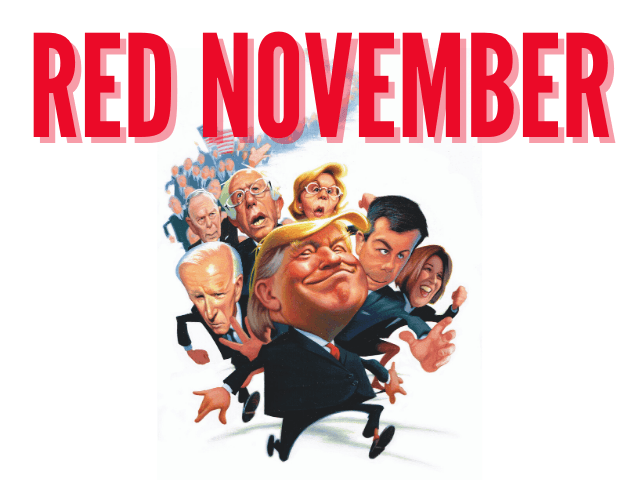The following is an excerpt from Red November: Will the Country Vote Red for Trump or Red for Socialism?, the new book by Breitbart News Senior Editor-at-Large Joel B. Pollak, released today by Center Street, a division of Hachette Book Group.
Red November is available for purchase here. The excerpt is from pages 31-33.
The 2020 Democratic Party presidential primary was to be defined by debate over a set of unabashedly socialist policies: free health care (“Medicare for All”), free college, free passage across the border, free jobs, free abortion on demand, and an environment free of fossil fuels (the Green New Deal).
Free everything, in return for nothing—paid for by taxing the rich.
Some—notably, Bernie Sanders—admitted that they would tax the middle class, too, but claimed the savings those taxpayers would receive would more than make up for the burden they would be made to bear.
It was an extraordinary response to the defeat of 2016, in which large portions of the American electorate, particularly in the Upper Midwest, appeared to have shifted to the right. Counties that Barack Obama had won twice in the Rust Belt chose Trump instead. The Republican nominee—once a Democrat himself—won states like Michigan, Wisconsin, and Pennsylvania, which had eluded the GOP since the era of Democrat‐turned‐Republican Ronald Reagan.
That ought to have spurred reflection among Democrats as to whether their party’s increasingly “progressive” policies had alienated the middle‐class voters they claimed to represent.
Instead, the opposite happened: the 2020 candidates stampeded to the left.
Even Joe Biden rejected the “moderate” label, telling reporters that he was still a “liberal” in a changing party: “For my whole career, I wish had been labeled in Delaware, for the seven times I ran, as a ‘moderate’.” He lamented the shift, noting sardonically: “The definition of ‘progressive’ now seems to be changing. That is, ‘Are you a socialist? Well, that’s a real progressive.’ ” He rejected the conventional labels, calling himself “an Obama‐Biden Democrat” instead.
Of course, Obama was partly responsible for the party’s ideological shifts. And there were also other factors.
One was simply that the Cold War had faded too far from the memory of many Americans—particularly younger ones—to make them fear socialism or even understand it. Contemporary examples of failure like Venezuela or struggling South Africa (where communists sat in government) notwithstanding, young Americans polled in 2014 said they did not trust government but wanted more of it. By 2019, one poll found that 61 percent of Americans ages 18 to 24 had a positive reaction to “socialism” while just 58 percent had a positive reaction to the word “capitalism”; the difference was barely within the poll’s 3.5 percent margin of error (among 2,777 adults).
College campuses became increasingly dominated by the left, as the radical protesters from the 1960s had returned by the 1990s to teach and to lead, shaping new generations in their image. Many young Americans yearned for a larger cause like the civil rights struggle or the Vietnam War had been for their parents, a cause that they could make their own.
Other cultural changes also pulled Democrats to the left. The gay rights movement, having won the right to marriage nationwide, pressed further. Gender could no longer be driven by biology. No lesbian, gay, bisexual, transgender, queer (LGBTQ) person could be free, it seemed, until the old norms were overthrown. Tolerance was no longer the goal: society itself had to be transformed.
Two catalytic events had also shaped the views of young Americans. One was the Iraq War, which the majority of Americans had originally supported but which many came to oppose as the rebuilding effort failed and fighting bogged down in counterinsurgency. Because there was no draft, the war did not have the same sweeping social effects as the Vietnam War had, but it eroded the trust that many Americans had in the traditional leaders and institutions that had originally made the case for intervention.
The other major event was the Great Recession of 2007–2009. When the housing bubble burst, it took with it the American dream of homeownership for many people. The policies of the Obama administration, which emphasized regulation and redistribution, slowed the economic recovery. Many young people, weighed down by student loans, came of age in an era when the free market seemed far less attractive than the proffered ideal of a society well managed by intelligent bureaucrats. Others, conversely, living—under Trump—through what proved to be the longest economic recovery in the history of the country, became convinced that the country could afford to do more to help the poor. To many young Americans, socialism seemed both necessary—and affordable, given the political will.
Another factor tempting Democrats to the left was Trump himself. The fact that he had won against all expectations and that he continued to defy rhetorical conventions (even though, more quietly, he was arguably more scrupulous than his predecessor about observing constitutional limits) unleashed the dreams of the left.
Democrats had watched the other side win an astonishing victory. More amazing, Trump—defying opposition, as Obama had done—had fulfilled his campaign promises to his conservative base. In so doing, he had liberated the left to think about what might be possible when they regained power.
Why not campaign openly on the radical agenda at which Obama had only hinted?

COMMENTS
Please let us know if you're having issues with commenting.